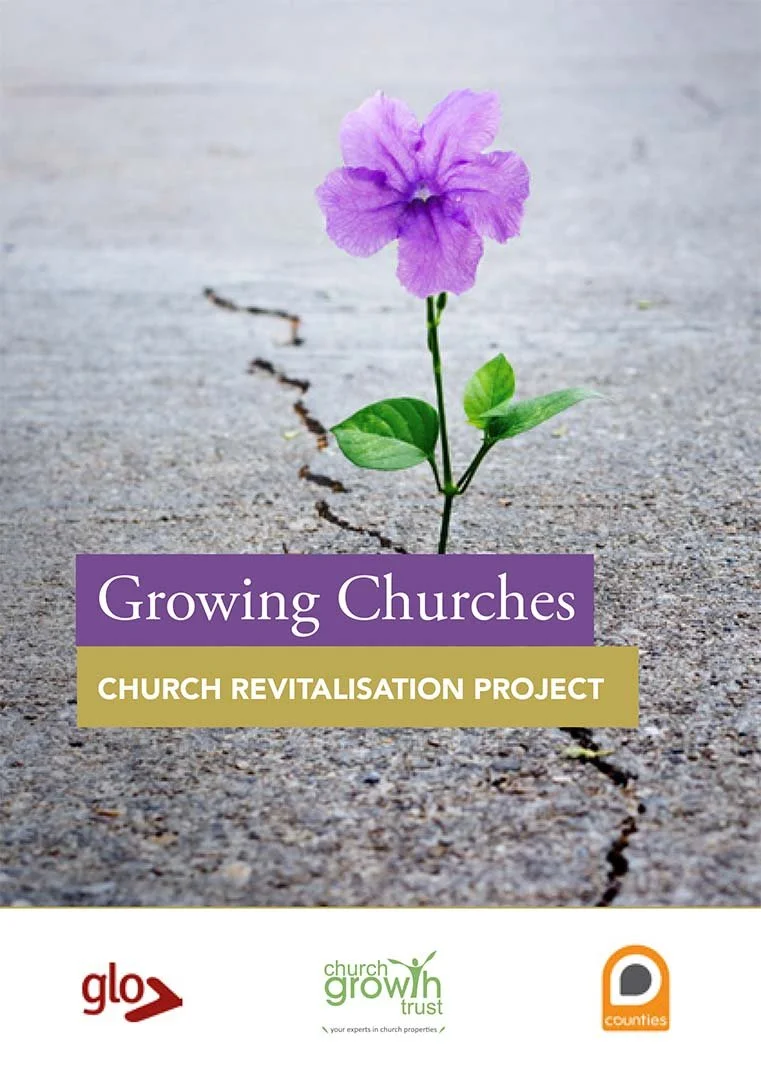
Church Revitalisation
The Church Revitalisation Collaboration is a multi-year pathway to help local churches grow.
Read our Information Leaflet and start the process today!
WHO IS IT FOR?
The Church Revitalisation Project can help:
Dwindling congregations
Ageing congregations
Congregations lacking younger members
Congregations lacking leaders
Since launching in 2016, 60 churches have been through the process.
The Church Revitalisation Project uses Revelation ch2-3 as its inspiration. Six reasons why revitalisation is great.
Grows us in our love for Jesus
Builds on the past
Often establishes a multi-generational congregation
Empowers forgotten believers
Values marginalised communities
Uncovers hidden gospel frontiers
WHAT WILL YOU LEARN?
The pathway involves an advisor working with you for an initial 2-3 years.
Where required the pathway can involve a part-funded worker to develop the growth of churches.
The Church Revitalisation Project involves advisors from experts in church properties: Church Growth Trust; GLO who grow mission focused churches in Europe and Counties.
When elderly leaders struggle with challenges and change, this project aims to listen.
Giles Arnold, Chief Executive at CGT and Chairman of the Revitalisation Operations Team
“Since we launched the project, we have been privileged to work with a number of churches and to watch them grow and develop. Some people only think about “revitalisation” when it’s too late and they have already become too small and weak to be revitalised. They require resuscitation or resurrection! We have improved the booklet because we think it’s better to encourage churches to engage with the project at an earlier stage. We want to speak to them when they have problems but can still see a way through them. When addressed through our Church Health Checks and mentoring inputs, that church can begin a whole new journey of revitalisation.”
Mark Davies is an Elder at one of Church Growth Trust’s properties, Highgate International Church (HIC) London, and the Regional Training Director for GLO, one of Counties’ partners on this project.
“For us, it is not so much about starting new things, as building a team for the future, futureproofing our church against what was a dwindling and ageing congregation. Without the clarity that a health check brings, the mentoring and, in HIC’s case, the hands-on support from the project, our future would not be looking so positive.”
Revitalisation Book
Free
- A free e-book to help you assess what kind of revitalisation you need and what to do about it
- Yours to keep Plenty of time to prayerfully respond.
- Assessing where you are:
- Vitamin tablets
- Taking the medicine
- Surgery required
- Heart transplant
- End of life care
- Stories of renewal and revitalisation:
- Regrowing churches
- Resource churches
- Merging with another church
- A different church taking over and becoming a new church
- Three sections of progression with 40 pages. Ideal to read in one sitting or review at your leisure with your leadership team
Revitalisation Process
£
300
for initial report
- Make Jesus known with an independent assessment of your church by advisors from Counties, GLO or Church Growth Trust
- Commission a part-funded church worker: the report can recommend your church for funding
- Inspire your Leadership team: receive feedback from our Church Health Check process alongside our advisor
- Equip your Church Members: your advisor provides you a platform to steer the way ahead
- Unlock your growth potential by receiving care, training, coaching, consulting and a forum for support after the initial report
Frequently asked questions
-
Yes! Contact us for a confidential chat.
Of course, first and foremost, there must be capable leadership. Proverbs 29:18 (AV) declares that “where there is no vision, the people perish”. The same is true for churches. If the members of a church have no idea where they are going; if they lack purpose, inevitably discouragement will set in. Alternatively, if there is a vision to follow; if people can be excited and united behind a core purpose, then they will be motivated and willing to make a contribution.
Ultimately vision comes from the leadership. They may take advice. They would also prayerfully ask God to lead and guide, but they have to produce a vision that people in the church are willing to follow. However, good leadership is not just about producing a vision statement; communication is also vital. Unless everyone understands the vision and also their role in fulfilling it, nothing will happen. Communication is much more than just conveying information; it should be done in such a way that people will want to respond and make sacrifices in order to achieve the vision. In other words, as leaders communicate the vision, they need to be inspiring. Vision is caught, not taught.
Leadership also involves facilitation. Every church has its members, and all will have spiritual gifts and practical skills that they can utilise for the benefit of the church. There are also needs to be met, jobs to be done and challenges to overcome. Including members together agreeing to begin the process of Church Revitalisation.
-
Yes! A handful of willing workers will be more effective than a much greater number of passengers.
As well as good leadership, a church needs to have willing people in order to function properly. We are, as church members, the body of Christ. It is our job to serve so that the church can be blessed and grow. While it is true that every Christian has spiritual gifts, it is equally the case that there needs to be a willingness to use these gifts, before they can become effective.
Every church needs willing workers. Nothing can happen without them and they need to be dependable and committed. It is of only secondary importance how old or young or how many church members there are.
True, a larger church will have a greater capacity to do things, but the example of the 12 disciples shows us what can be achieved if a few ordinary but motivated people set out to serve Christ. A handful of willing workers will be more effective that a much greater number of passengers.
-
Yes! Contact us for a free confidential chat
Growing churches need a place to meet and from which to operate. Here we are not necessarily talking about using purpose-built church buildings. Indeed, the early church did not build purpose-built buildings for a couple of centuries. They were much more inclined to use public buildings such as the lecture hall of Tyrannus (Acts 19:9) or to meet in homes (Acts 2:46).
Today it is common for churches to use schools, community centres and restaurants, as well as houses, to meet in. The major factor to consider is practicality. If whatever building that is being used is fit for purpose, then it is a good location for the church to use.
A building should be a servant to the church, not the main focus. If the building is not fit for purpose, or in the wrong location, then consideration should be given to changing it to improve the existing building or, in some cases, to relocate.
-
The Church Health Check follows this process, but may be adapted to a specific situation.
Free Initial Meeting with Leadership
The Church leadership team will be asked to complete an Initial Questionnaire which requests basic information about the church and their reasons for requesting a Church Health Check and what they hope to gain from it.
A local adviser will be assigned and contact the Church Leadership Team and agree dates to meet and conduct the Church Health Check.
Before meeting the Leadership Team, the adviser will seek to carry out an Unannounced Visit to the church to gain as genuine first impression as possible and then complete a visit report which will be given to the Leadership Team and discussed, if necessary.
The adviser will have a Meeting with the Leadership Team to clarify the Church Health Check process and address any questions/concerns. This will include asking more detailed questions about the way the leadership functions. At this meeting the type of Church Health Check will be decided on – either a health check with just the Leadership Team or with the whole church. The £300 fee for the Church Health Check and the Advisor's expenses will be agreed.
Church Health Check Day
The Health Check has three components which may be handled in different ways depending on the specific type of health check chosen and the aim of the Church Health Check. The components are:
1. Whole Church Health Check day. A planned day where the whole church would meet, receive some teaching and go through various exercises together to determine the genuine strengths and struggles of the church.
2. Congregation Questionnaires. Anonymous questionnaires, on various aspects of church life, are used for all the congregation (including leaders) to complete on that day
3. Leaders Questionnaires. Depending on the type of Church Health Check, this can be an appendix to the main questionnaire or a separate one. The aim is to ask the Leadership Team more in-depth questions about key aspects of church life including leadership, vision, disciple- ship and church structures.
Debrief Meeting with Leadership: After the day, a meeting with the Leadership Team to discuss the responses from the Church Health Check questionnaires. Take up some of the key issues that have emerged
Signposting to funding a worker if recommended
Produce a Post Check Action Plan and a 2-3yr timetable for the way ahead.
Any agreement about if/how the adviser would continue to work with the leadership is decided.
Final Written report to Leadership Team. This in many senses should not contain any surprises, as all matters have been discussed in previous meetings.
-
The process begins with a Free Initial Meeting with Leadership
The Church leadership team will be asked to complete an Initial Questionnaire which requests basic information about the church and their reasons for requesting a Church Health Check and what they hope to gain from it.
A local adviser will be assigned and contact the Church Leadership Team and agree dates to meet and conduct the Church Health Check.
Before meeting the Leadership Team, the adviser will seek to carry out an Unannounced Visit to the church to gain as genuine first impression as possible and then complete a visit report which will be given to the Leadership Team and discussed, if necessary.
The adviser will have a Meeting with the Leadership Team to clarify the Church Health Check process and address any questions/concerns. This will include asking more detailed questions about the way the leadership functions. At this meeting the type of Church Health Check will be decided on – either a health check with just the Leadership Team or with the whole church.
£300 fee and Advisors costs
The £300 standard fee is paid to Counties as a contribution towards managing the process.
It is appreciated if the church can contribute to and where possible cover the adviser’s time and travel expenses involved in carrying out a Church Health Check (CHC). Where possible any travel costs of the adviser are covered by the local church too.
Costs would be discussed at an early stage and will be kept to a reasonable level.
If additional advice is requested, the financial arrangements would be discussed at that stage and are often a matter of agreement between the church and the adviser.
However, if your church really cannot afford to pay the fee of £300, but this is something you feel would be of benefit, please do contact us as we would not want to see finances being an obstacle to revitalisation.
-
Free Initial Meeting with Leadership
The Church leadership team will be asked to complete an Initial Questionnaire which requests basic information about the church and their reasons for requesting a Church Health Check and what they hope to gain from it.
A local adviser will be assigned and contact the Church Leadership Team and agree dates to meet and conduct the Church Health Check.
Before meeting the Leadership Team, the adviser will seek to carry out an Unannounced Visit to the church to gain as genuine first impression as possible and then complete a visit report which will be given to the Leadership Team and discussed, if necessary.
The adviser will have a Meeting with the Leadership Team to clarify the Church Health Check process and address any questions/concerns. This will include asking more detailed questions about the way the leadership functions. At this meeting the type of Church Health Check will be decided on – either a health check with just the Leadership Team or with the whole church.
No fee or expenses will be charged until the Leadership agree to commence the Church Health Check process.
If the church are not satisfied with their Advisor, they can contact Counties and request another, subject to availability.
-
We'd love to help. Just send us an email revitalisation@countiesuk.org
Our helpful team will get back to you as soon as we can, usually within 3 working days Mon-Fri.









